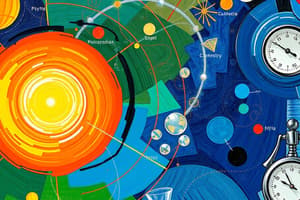Podcast
Questions and Answers
What was a significant change brought about by the Scientific Revolution?
What was a significant change brought about by the Scientific Revolution?
- Scientific thought remained consistent with Greek ideas.
- Science merged closely with philosophy and technology.
- Science was primarily focused on theoretical pursuits.
- Science became recognized as having utilitarian goals. (correct)
Which philosopher's ideas supported the geocentric model of the universe?
Which philosopher's ideas supported the geocentric model of the universe?
- Galileo Galilei
- Nicolaus Copernicus
- Isaac Newton
- Aristotle (correct)
What was Copernicus's contribution to astronomy?
What was Copernicus's contribution to astronomy?
- He proposed the sun as the center of the known universe. (correct)
- He established that planets move in elliptical orbits.
- He provided detailed calculations for planetary motions.
- He developed the geocentric model of the universe.
Which of the following was a limitation of Copernicus's model?
Which of the following was a limitation of Copernicus's model?
The geocentric model of the universe was refined by which astronomer?
The geocentric model of the universe was refined by which astronomer?
Which celestial body was thought to revolve around the Earth in the geocentric system?
Which celestial body was thought to revolve around the Earth in the geocentric system?
Which statement best reflects the Scientific Revolution's impact on nature's understanding?
Which statement best reflects the Scientific Revolution's impact on nature's understanding?
Who is considered the 'Father of Modern Astronomy'?
Who is considered the 'Father of Modern Astronomy'?
Which individual is credited with proposing the law of planetary motions?
Which individual is credited with proposing the law of planetary motions?
Who is known for providing mathematical equations to support Copernicus's heliocentric theory?
Who is known for providing mathematical equations to support Copernicus's heliocentric theory?
Which scientist is referred to as the 'Father of microbiology'?
Which scientist is referred to as the 'Father of microbiology'?
What theory did Charles Darwin present in 1859?
What theory did Charles Darwin present in 1859?
Which scientist influenced Charles Darwin through his work in geology?
Which scientist influenced Charles Darwin through his work in geology?
What type of reasoning did Rene Descartes practice?
What type of reasoning did Rene Descartes practice?
Which concept is central to Darwin's idea of natural selection?
Which concept is central to Darwin's idea of natural selection?
Which of the following works did Charles Darwin publish in 1839?
Which of the following works did Charles Darwin publish in 1839?
Erasmus Darwin quietly introduced the idea of evolution in which century?
Erasmus Darwin quietly introduced the idea of evolution in which century?
What was the significance of Darwin's observations of species across different regions?
What was the significance of Darwin's observations of species across different regions?
Which of the following describes Freud's view of human nature?
Which of the following describes Freud's view of human nature?
Who was known for using the scientific method alongside Francis Bacon?
Who was known for using the scientific method alongside Francis Bacon?
Which theory reconciles evolution and heredity?
Which theory reconciles evolution and heredity?
What was the main influence of Darwin's travels on his theories?
What was the main influence of Darwin's travels on his theories?
What is primarily responsible for human behavior according to Freud's Psychoanalytic theory?
What is primarily responsible for human behavior according to Freud's Psychoanalytic theory?
What does the term 'catharsis' refer to in Freud's theory?
What does the term 'catharsis' refer to in Freud's theory?
Which of the following best describes the ID in Freud's structure of personality?
Which of the following best describes the ID in Freud's structure of personality?
What role does the ego play in an individual's personality according to Freud?
What role does the ego play in an individual's personality according to Freud?
What does the superego primarily contain according to Freud's theory?
What does the superego primarily contain according to Freud's theory?
Which instinct represents aggressive and destructive behaviors in Freud's model?
Which instinct represents aggressive and destructive behaviors in Freud's model?
What do the ideal ego and conscience within the superego refer to?
What do the ideal ego and conscience within the superego refer to?
How does Freud's theory view the ability of individuals to make choices?
How does Freud's theory view the ability of individuals to make choices?
What is the main focus of Eros in Freud's theory?
What is the main focus of Eros in Freud's theory?
What does the ego balance according to Freud's psychoanalytic perspective?
What does the ego balance according to Freud's psychoanalytic perspective?
Flashcards are hidden until you start studying
Study Notes
Scientific Revolution
- A drastic change in scientific thought that occurred during the 16th and 17th centuries
- Challenged existing views of nature based on Greek ideas that had dominated science for almost 2,000 years
- Established science as an autonomous discipline distinct from philosophy and technology
- Emphasized utilitarian goals for scientific inquiry
Copernican Revolution
- Focused on a shift from the geocentric to the heliocentric system
Pre-Copernican System (Geocentric System)
- Originated from the Greek philosopher Anaximander of Miletus (c. 610-546 B.C.)
- Pythagoras (c. 570-495 B.C.) suggested the Earth was a sphere
- Plato's (c. 428-348 B.C.) explained the cosmos were made of geometric shapes circling around the Earth
- Aristotle (384-322 B.C.) believed the Earth was the center of the universe with all other celestial bodies in concentric crystalline spheres around it.
- Popularized by Ptolemy in 140 AD, refining the explanation behind the movement of planets and solidifying the belief that the Earth was unmoving while the Sun, planets, and stars revolved around it.
Copernican System (Heliocentric System)
- Devised by Nicolaus Copernicus (1473-1543)
- Copernican Model positioned the Sun as the center of the known universe, with the Earth's rotation causing the rising and setting of the Sun and the changes of the Seasons.
- Initially rejected due to its conflict with Aristotelian Physics and the lack of math for describing his model.
Copernican System (Validation)
- Validated through the work of:
- Tycho Brahe (1546-1601) who combined Copernican and Ptolemaic Systems
- Johannes Kepler (1571-1630) who proposed his law of planetary motions in 1609
- Galileo Galilei (1564-1642) who published a book reinforcing that the Earth revolved around the sun based on his observations
- Sir Isaac Newton (1642-1726) provided the first mathematical equations to prove Copernicus’s notions
Key Figures of the Scientific Revolution
- Giordano Bruno (1548-1600) - Spread Copernicus’s theory of a heliocentric universe
- Robert Boyle (1627-1691) - Used the Scientific Method
- Francis Bacon (1561-1626) - Father of Modern Chemistry
- Antonie van Leeuwenhoek (1632-1723) - Known as “The father of Microbiology” - He discovered bacteria
- René Descartes - Practiced deductive reasoning and used the scientific method for problem solving
Pre-Darwinian Belief
- Evolution in Biology is the slow change in the characteristics of a species over time
- It has always been a controversial subject as it conflicted with religious beliefs
- Erasmus Darwin (Late 18th Century) quietly introduced the idea of evolution to England and France.
Darwin’s Theory of Evolution
- Charles Darwin entered Edinburgh University at the age of 16 to study medicine.
- His interests shifted to natural sciences and he collaborated with:
- Robert Edmond Grant (anatomist and zoologist )
- Jean-Baptiste Lamarck (Biologist)
Darwin’s Theory of Evolution: Exploration
- Influenced by prominent individuals:
- Adam Sedgwick
- John Stevens Henslow
- Collaborated with:
- Sedgwick for geological research and mapping the strata of Wales
- Henslow in Tierra del Fuego to survey the world
- Collected and studied various specimens through close observation and research.
Darwin’s Theory of Evolution: Exploration (continued)
- 1836 - Wrote his findings in the Journal of Researches, later published in Fitzroy’s narrative Zoology of the Voyage of the HMS Beagle.
- Travelled to Tierra del Fuego with Captain Fitzroy on the HMS Beagle
- Established a radically different theory on the origin of living things than previous naturalists
Darwin’s Theory of Evolution: Exploration (continued)
- 1839 - Published his account of the voyage - The Voyager of the Beagle
Darwin’s Theory of Evolution: Observations
- Noticed similarities between different species in different parts of the world from a common ancestor
- Species survive through “natural selection” - a process where species adapt to changing environments or die out if they cannot adapt.
- 1859 - Presented and published his theory in “On the origin of Species by Means of Natural Selection”
Darwin’s Theory of Evolution: Exploration (continued)
- Dubbed as the “Father of Evolution”
- His findings scrutinized by:
- Anatomist Richard Owen
- Darwin's Uruguay Skull came from South American Capybara
-
Ornithologist John Gould- Bird specimens Darwin brought from Galapagos were Ground Finches
- Galapagos mockingbirds were from 3 species unique to each island
- Anatomist Richard Owen
Evolutionary Science and Philosophy
- Completed the Copernican Revolution
- Demonstrated that nature operates through biological systems, with an orderly system governed by natural laws
- Led to the development of different fields:
- Evolutionary Biology - Origin of life and diversification/adaptation of life
- Neo-darwinism - Reconciles Evolution and Heredity
- Philosophy of Biology - Relates biology to classic issues in the Philosophy of Science
Freudian Revolution
- Focused on the work of Sigmund Freud in psychoanalysis.
Sigmund (Sigmund) Freud
- Father of Psychoanalysis
- Spends a lifetime expanding humanity’s self-knowledge through clinical research and corresponding theories
- Learned hypnosis from Joseph Breuer, a treatment for hysterical patients.
Freud's Psychoanalytic Theory – Human Nature
- Emphasizes the Deterministic view of human nature
- Human behavior is determined by unconscious motivations:
- Biological and instinctive drives
- Human beings have no real ability to make choices and control life events
- Freud’s theory sees drives or instincts as recurring themes
- Human nature is an exchange of energy and transformation, captured in the term Catharsis - the release of energy.
Freud’s Psychoanalytic Nature – Main Instincts
- Eros (Survival Instincts) - Basic instincts like hunger, thirst, and sexual impulses
- Thanatos (Aggressive and Self Destructive Instincts) - Destructive instincts driven towards death
Freud’s Psychoanalytic Nature – Structures of Personality
- ID: Unconscious aspect of personality, containing untamed instincts and impulses. It requires immediate gratification of all desires, wants, and needs, seeking only pleasure.
- Ego: Responsible for dealing with reality, acting as a referee to balance the needs of the ID with social norms. Uses realistic and logical thinking to acceptably satisfy needs.
- Superego: The judicial aspect of personality, holding internalized moral standards and ideals from relationships and society, forming guidelines for judgment.
- Parts
- Ideal Ego: Includes rules and standards for good behavior learned from parents or authority.
- Conscience: Space for self-evaluation and criticism, housing information on things viewed as bad/evil by parents or society.
Studying That Suits You
Use AI to generate personalized quizzes and flashcards to suit your learning preferences.




